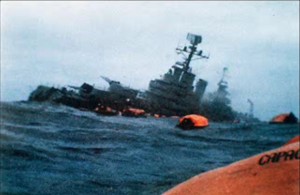Analysis: Interception of Orders from Argentina, + Who was responsible for sinking the Belgrano?
Full transcript:
Where reasonable people cannot differ is that when Mrs Thatcher says that no news of the Peruvian proposals reached London until three hours after the Belgrano was sunk, or more precisely, in answer to the Shadow Cabinet, written on behalf of the Shadow Cabinet by Denzil Davis, the spokesman, she said that the first indications of the Peruvian Proposals reached London at 11.15 pm Sunday 2nd of May. That is not true. Michael Harbottle used the word “Sabotage.” I haven’t used that particular word before but I think it is a very apt description of the situation.
Now you asked me some precise questions, first of all, about the Belgrano itself. Though, from the 2nd of April I had opposed the sending of the Task Force, as you said in your introduction, on the 3rd of April I had pleaded to speak, to put a consensus point of view; but Mr Speaker George Thomas, to his eternal discredit, would have none of it: not because he didn’t call Tam Dalyell, but because he didn’t call any of the more vociferous dissenters. And we now know from his memoirs why: because he took a view of the National Interest, that the Prime Minister had to be supported. The memoirs of George Thomas really are very revealing.
On the 4th of April I made a statement, fully carried in the heavy newspapers: that the sending of the Task Force was the most ill-conceived expedition to leave these shores since the Duke of Buckingham went to La Rochelle in 1627. I opposed the sending of the task force.
However I want to tell the panel that I did not criticise the sinking of the Belgrano on the 4th of May. It happened on the 2nd of May, on the 4th the House of Commons had it’s first opportunity, and I asked whether it was done with the authority of the Prime Minister. “Yes” came the answer, “full political control.”
And because war is very nasty and because like my colleagues, I believed the explanation that John Nott had given, that this was some submarine commander acting fast to protect the Task Force – because after all the Belgrano was “converging” was the word, on the Task Force; that war was very unpleasant, that this was the protection of British Service men. And that was what I accepted as Gospel until July 1982, when I read, on page seven it was, of the Scotsman newspaper, an artless article by a reputable journalist Eric Mackenzie who had been sent to welcome home the Conqueror to Fazlane and had asked a question that flowed logically from what Nott had said in the Commons. “Why Commander, Wrenford Brown, did you sink the Belgrano?”
And his answer was very revealing. “Oh” he said “I didn’t sink the Belgrano off my own bat. I wouldn’t do a thing like that. I am a first time Submarine Commander. I did it,” he said, “On orders from Northwood.”
Now this was totally different to what Parliament, press and people had been told; and I put it to the panel that it is the old question of small inconsistencies being part of larger inconsistencies, small lies being part of larger lies. Now, if in August or September or October 1982 the Government had made anything like a clean breast of it and said “Look, we had to enter into some deception, this is war, the real position is” – Instead, we got a whole series of false statements, and they had to do it because of the Burdwood Bank. And when I went to the briefing at the Ministry of Defence, Sir Sandy Woodward said, “Well we had to do it urgently because …” – and this was the answer to Parliamentary Questions – “because otherwise we would have lost the Belgrano in going over the Burdwood Bank.”
Now when one looked at the coordinates, she had been and was going and was known to be going nowhere near the Burdwood Bank. Anyhow these waters are well charted, an average depth of the Birdman Bank 90 fathoms, minimum depth 25 fathoms – these SSMs are built with the capacity to operate in the Baltic which is a shallow sea, and it just, to anybody who knew the detail …

